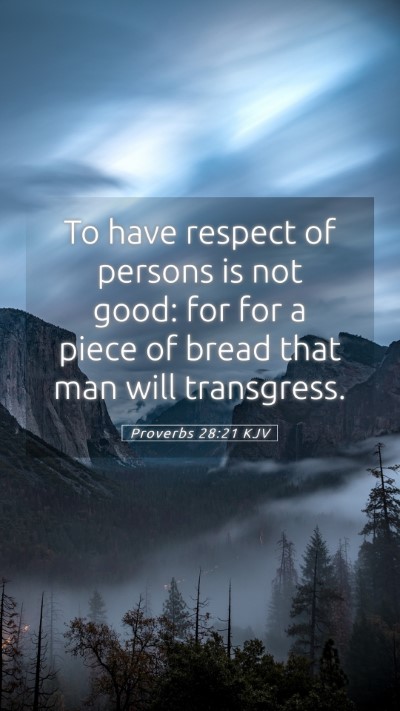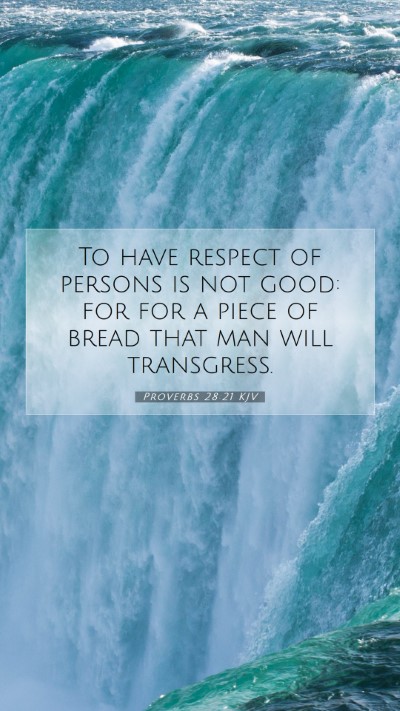Understanding Proverbs 28:21
Bible Verse: Proverbs 28:21 - "To have respect of persons is not good: for for a piece of bread that man will transgress."
Summary of Commentary Insights
Proverbs 28:21 presents a clear moral teaching regarding partiality and its consequences. The verse warns against the tendency to show favoritism, which is considered an unjust action. Various public domain commentaries shed light on the implications of this proverb, providing a rich understanding of its application.
-
Matthew Henry's Commentary:
Matthew Henry notes that showing partiality can lead to corruption of judgment. Favoring one over another for personal gain undermines justice and righteousness. He emphasizes that it reveals a selfish motive, suggesting that one might betray their principles for something as trivial as a piece of bread.
-
Albert Barnes' Notes:
Albert Barnes elaborates on the dangers of favoritism in human relationships, highlighting that such actions are detrimental to both community and individual integrity. He indicates that the respect for persons leads to injustice, as decisions can be skewed by personal biases rather than objective truth.
-
Adam Clarke's Commentary:
Adam Clarke interprets this verse by emphasizing the destruction of societal values when favoritism is practiced. He suggests that such actions not only violate ethical standards but can result in severe moral degradation. Clarke stresses that each person's worth should be acknowledged without the influence of bias.
In-Depth Analysis
This proverb serves as a cautionary reminder about the pitfalls of favoritism, which can lead to moral compromises. Let's explore some key interpretations:
1. The Principle of Impartiality
The overarching theme of Proverbs 28:21 is the importance of impartiality. Favoritism can cause one to overlook the truth and act unjustly. A person who compromises their principles for ephemeral gains does not only affect themselves but also sets a negative example for others.
2. The Weight of Responsibility
Those in positions of authority or influence bear the responsibility of making fair and equitable decisions. This verse reflects the essence of ethical leadership, where decisions should be made free from personal bias and external pressures.
3. Social Implications
When favoritism becomes commonplace in a society, it can lead to societal fragmentation. Such behavior can undermine trust among individuals and erode the foundational principles of fairness and justice that hold communities together.
4. Application in Daily Life
Applying the teachings of Proverbs 28:21 involves recognizing our biases and actively working towards treating all individuals with equal respect, regardless of their status or material worth. This practice fosters an environment of trust and justice.
Cross References
This verse connects to several important biblical passages that reflect similar themes:
- James 2:1-9: Warns against favoritism in the church context.
- Leviticus 19:15: Calls for impartiality in judgment.
- Galatians 2:6-10: Relates to the principle of equality among believers.
- 1 Timothy 5:21: Speaks on the importance of impartiality in church leadership.
- Romans 2:6-11: Emphasizes God's impartiality in judgment.
Conclusion
Overall, Proverbs 28:21 serves as a vital reminder of the value of fairness and integrity. The insights from well-respected commentaries together enrich our understanding of this verse, guiding believers in their interactions and decisions. Recognizing the implications of favoritism not only enhances personal character but also contributes positively to the broader community.
Further Study and Reflection
In studying this verse and its meanings, individuals may benefit from engaging with Bible study groups or utilizing online Bible study tools. Resources such as study guides or plans focused on ethical living can aid in deepening one’s understanding of scriptural principles related to equity and justice.


